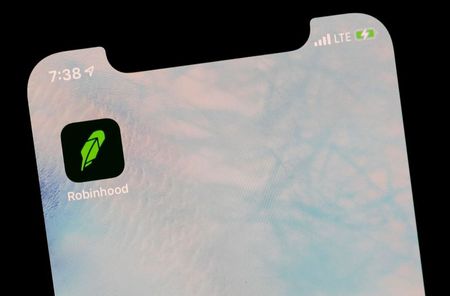By Chris Prentice and Pete Schroeder
WASHINGTON (Reuters) -Wall Street’s industry regulator fined Robinhood Financial LLC $70 million on Wednesday for “systemic” failures, including systems outages, providing “false or misleading” information, and weak options trading controls, saying those factors combined harmed millions of the app’s customers.
The Financial Industry Regulatory Authority (FINRA) fine is the latest hit to Robinhood’s reputation. The broker, which has been credited with democratizing trading, is under scrutiny by federal and state policymakers following this year’s meme-stock fiasco which raised questions over the California firm’s business model, risk management and customer treatment.
However, the sweeping agreement, which resolves alleged FINRA violations dating back to September 2016, likely paves the way for the firm to move forward quickly with a planned initial public offering that has been delayed due to meme-stock backlash and other regulatory queries.
Robinhood’s resolution with FINRA includes $12.6 million in restitution to thousands of customers and a $57 million penalty, the largest in the regulator’s history, and covers a range of issues dating back to September 2016, FINRA said in a statement.
“The fine… reflects the scope and seriousness of Robinhood’s violations, including FINRA’s finding that Robinhood communicated false and misleading information to millions of its customers,” said Jessica Hopper, Head of Enforcement at FINRA.
According to FINRA, those communications related to whether customers could place trades on margin, how much cash was in their accounts, how much buying power they had, the risk of loss customers faced in certain transactions, and whether customers faced margin calls.
FINRA noted that a Robinhood customer took his life in 2020 after becoming confused by messages in his account which appeared to show he had turned off margin trades and inaccurately showed a negative cash balance. Thousands of other customers suffered more than $7 million in losses due to similar mis-statements, FINRA alleged.
Between 2018 and late 2020 Robinhood also failed to properly supervise its technology, causing it to experience a “series of outages and critical systems failures,” including a major outage during the pandemic turmoil of March 2020, which led customers to lose money, FINRA said.
During the same period, Robinhood also failed to properly vet customers before allowing them to make risky options bets, FINRA alleged.
Robinhood neither admitted nor denied the charges, but consented to FINRA’s findings. The company said in a statement that it was overhauling its business, installing new supervisory and communications procedures, and has hired a slew of attorneys, including previous regulators.
“There’s a clear message: You can try to democratize investing and demystify finance, but you can’t cut corners,” said Robert Frenchman, an attorney with Mukasey Frenchman & Sklaroff, who added the settlement should be good news for the IPO.
“It’s good because it clears up such a wide range of issues that now they can say they have settled with regulators. I can see the value – it’s a lot of money – in settling on such a salad of FINRA violations.”
FINRA, a self-regulatory body which reports to the Securities and Exchange Commission (SEC), in 2019 fined Robinhood $1.25 million for order execution failures.
The SEC has also taken aim at Robinhood, last year fining the company $65 million to settle charges it misled customers about its revenue sources.
Still, Robinhood’s legal and regulatory woes are unlikely to be over. The SEC is also mulling new rules to rein in “gamification,” game-like features that encourage trading, and payment-for-order flow, whereby brokers send retail customer orders to wholesale brokers in return for a fee – practices both deployed by Robinhood.
Massachusetts Secretary of State Bill Galvin, who is also pursuing a case against the company, said he was “delighted” FINRA had pursued Robinhood’s misconduct, but questioned whether the $12.6 million customer restitution was sufficient.
(Reporting by Pete Schroeder and Chris Prentice in Washington, additional reporting by Nate Raymond in Boston and Anirban Sen in BengaluruEditing by Paul Simao, Michelle Price, Rosalba O’Brien and David Gregorio)





